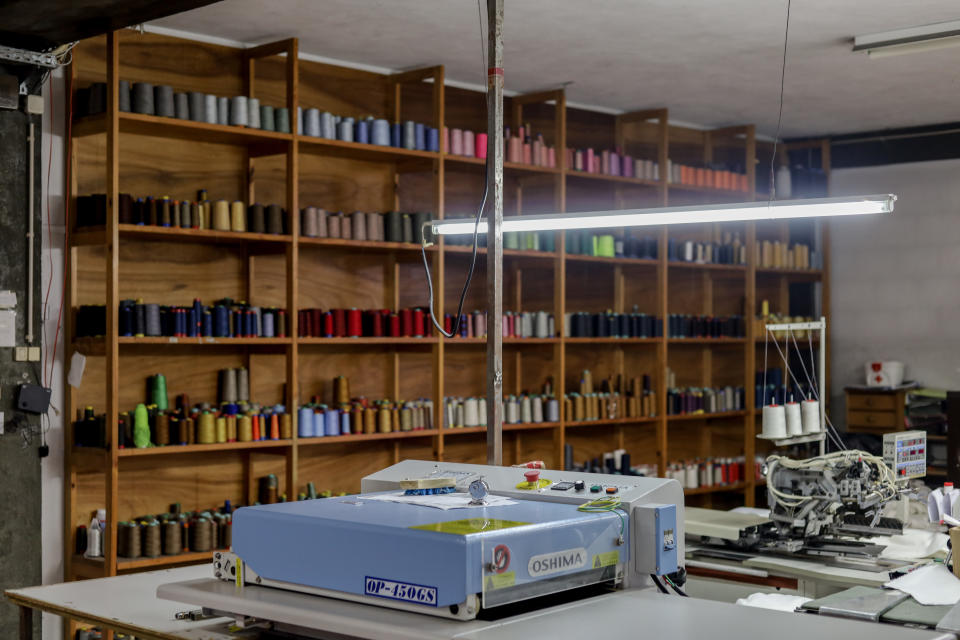Meet ISTO, the Portuguese Brand Pushing Sustainability With ‘Factourism’ and Price Transparency

MILAN — A tour among factories offered to end consumers is one of the implementations setting Portuguese brand ISTO apart when it comes to transparency.
Rather than merely talking about its environmental and social commitment, the company came up with the concept of “factourism” to let customers experience first-hand how its products are made.
More from WWD
The project adds to initiatives that range from providing price transparency to on-demand production that supports the eco mindset behind the brand, which was launched in 2017 by a trio of young talents hailing from different industries.
Pedro Palha, cofounder and chief executive officer of ISTO, fits the modern archetype of the Millennial entrepreneur: on the move, curious, clear headed and determined. Boasting a background in business management, he developed an interest in fashion and the direct-to-consumer model while working for a German company in Mexico in 2014. Upon his return to Portugal, Palha and his previous collaborator Vasco Mendonça — who specialized in advertising and digital marketing — started to envision a brand that could answer to their personal demand for value-per-money clothing of understated elegance.
They were encouraged by their homeland’s potential, as Portugal boasts a dense concentration of textile factories supplying international brands. “I think our fashion industry exports around 95 percent of what it produces….We have a lot of quality and expertise, but we don’t have a lot of fashion culture compared to [other countries],” Palha noted.

The scarcity of local brands further widened the gap to fill in the market, encouraging Palha, Mendonça and graphic designer Pedro Gaspar to eventually start ISTO and root the company in sustainability and classic designs.
“We all liked well-made clothing but couldn’t find any at an affordable price. Everything we liked at that moment was either very cheap or very expensive,” Palha said. “But most importantly, we wanted to build something that had a purpose. Everything had to be consistent and to make sense.”
Hence the product assortment is hinged on a permanent collection of wardrobe essentials conceived for longevity with their minimalist designs and with circularity in mind, given they are crafted using organic and recyclable fabrics provided by certified suppliers. The brand also reflects the understated nonchalance of Portuguese style, the country’s colors via the natural palette and an overall sense of ease and pragmatism that define the local approach to life.

Standing for the Portuguese term for “this,” the brand’s name itself is the acronym of its four pillar features, which are independent thinking, superb quality, transparency and organic textiles. Palha particularly underscored the financial independence of the company, which enables the founders to set their own conditions in terms of the frequency of drops and to avoid following the fashion industry’s seasonality and trends.
“We took six months to develop our white T-shirt and another six for the Oxford shirt…the whole brand started with the two most essential items for men…with no money and no marketing budget, only our good storytelling,” said Palha, underscoring that the opening of the brand’s first store in Lisbon in 2018 “helped us to grow and to reinvest everything in our collection.”
Launched as a menswear brand, ISTO’s collection now encompasses basics such as T-shirts, linen shirts, polos, corduroy pants, chinos, wool sweaters and safari jackets. A womenswear selection, an undyed line and accessories such as scarves, belts, beanies and baseball caps are included in the offering.

The “Factourism” project kicked off earlier this year to further enhance storytelling while serving the overall mission of empowering customers with knowledge and transparency. Attendees to the initiative can learn about the processes and understand how organic clothes are made via free, guided tours to the northern part of the country, where the local textile hub and the factories ISTO works with are located.
So far each trip counted around 26 people, selected upon registration on the brand’s website. “We had reached even 200 people subscribing for a trip, with some users hailing even from Singapore,” Palha said. The cofounder is committed to organizing tours more frequently in light of the rising interest and since he believes that “nowadays is important to be close to our customers and give them a personalized experience.”
Another tool ISTO leverages to perpetuate its full-transparency mission is its website, where the lists of suppliers is displayed. Mostly local SMEs, these include the family business NGS Malhas producing the jersey for ISTO’s T-shirts and sweatshirts; the Orfama firm for knitwear; the Docas Confecções shirt specialist, and the Somelos company that supplies the shirting fabrics, from linen to flannels, to name a few. Lamosa also manufactures the brand’s bestselling work jackets, which are available on-demand through a service that further mirrors ISTO’s quest to limit over-production, reduce waste and minimize its environmental impact.

At the brand’s online platform, extensive information on the production processes, deep dive on fabrics’ features and clothes care guides are flanked by pricing details, which enable users to have a clear understanding of how much ISTO paid for each component of a garment.
For example, the material cost of single T-shirt selling at 34 euros is displayed to be 12.65 euros, broken down in the prices for the fabric at 6.38 euros; for the label at 0.14 euros; for the labor at 4.64 euros, and for the transportation at 0.09 euros. In the case of a 179 euro shirt, the material cost of the garment also shows expenses for salaries, marketing and rents.
Overall, ISTO’s prices range from 34 euros to 275 euros, with the average basket totaling around 140 euros, Palha said.
Despite the gradual expansion of the assortment, bestsellers remain the basic T-shirts in classic colorways, “which are impossible to beat since Day One,” in addition to the work jacket that Palha defined as a money driver due to its higher price tag.

Besides its e-commerce, the brand has four physical stores in Lisbon, ranging from its first flagship in the Príncipe Real neighborhood to the latest unit, which opened in the city’s oldest mall Amoreiras this month. Recently the company also opened a pop-up store in Oporto — a retail format that Palha is considering to expand abroad in the near future, starting from Paris.
The label already has an international footprint since sales online and outside Portugal account for 60 percent of total revenues. Overall, last year ISTO’s sales reached 1.2 million euros and they are expected to double in 2022, Palha said.
The U.S. is the best-performing market online, followed by Germany, France and the U.K., in addition to Portugal.
Today, most of the collection still targets the male audience, which drives 90 percent of sales. Even if through the years ISTO built on its womenswear offering, Palha said the company will now change strategy and halt the development of that division.

“I think we’re not putting enough effort on making women’s products at this moment, also because we don’t have like venture capital money [backing us]. We can’t do a lot of stuff, so we need to choose carefully what we do and we are taking a step back to focus on men’s and, again, on [understanding] what’s the purpose of women’s. Should we do or not do women’s? Is ISTO intended to be for women or is there even room for another women’s company? And if there is room, would it be under [the] ISTO [banner] or through another brand? What is our differentiation?” Palha said.
“Also there’s an interesting purchase behavior to reinforce this [focus on men’s]: there are less competitors [in terms of brands] and male customers are much more loyal to each brand. They buy less [frequently] but better. And when they do buy, they buy more [from ISTO] than women, who are always looking for new things, so we’re not that attractive for them.”
Palha’s intention is to pivot investments toward the addition of other wardrobe staples, boost outerwear to better cover the winter season and enhance the accessories offering.
Most recently, ISTO introduced blue jeans and cashmere sweaters. The former were developed with denim supplied by Italian specialist Candiani to ensure a sustainable approach to one of the most polluting fashion items; the latter are ISTO’s first product manufactured outside Portugal since they are entirely produced by the Italian textile company Cariaggi. Blue jeans and cashmere sweaters retail at 138 euros and 275 euros each, respectively.

Asked about competitors, Palha showed appreciation for Swedish brand Asket but underscored the difference in scale, following and backing. From his end, he remained open to the idea of having investors in the company as long as they bring additional value in expertise and know-how, rather than just a financial injection.
“We don’t lie, we want to make money but we want to do this in the long run. My dream is to leave this company to my grandchildren,” Palha concluded.
Best of WWD

